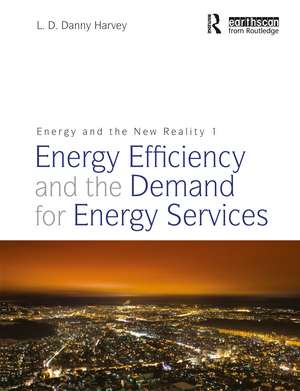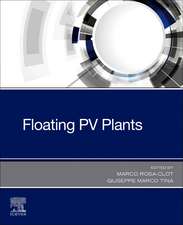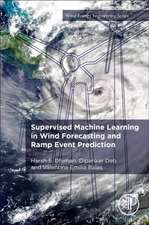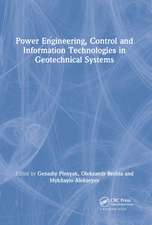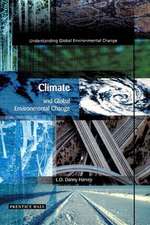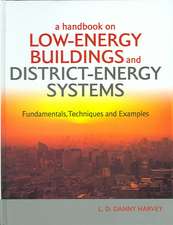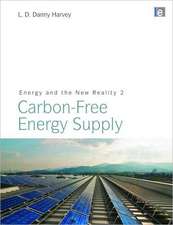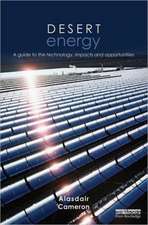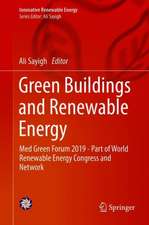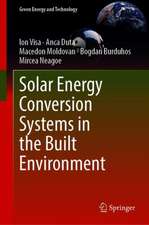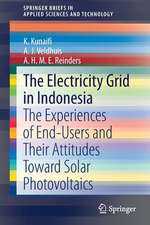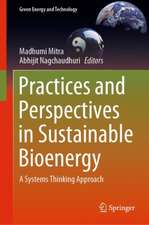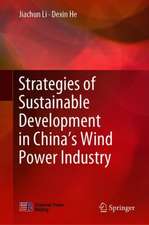Energy and the New Reality 1: Energy Efficiency and the Demand for Energy Services
Autor L. D. Danny Harveyen Limba Engleză Paperback – 2 apr 2010
The book begins with a succinct summary of the scientific basis for concern over global warming, then outlines energy basics and current patterns and trends in energy use. This is followed by a discussion of current and advanced technologies for the generation of electricity from fossil fuels. The book then considers in detail how energy is used, and how this use can be dramatically reduced, in the following end-use sectors:
- buildings
- transportation
- industry
- food and agriculture
- municipal services.
| Toate formatele și edițiile | Preț | Express |
|---|---|---|
| Paperback (1) | 442.49 lei 6-8 săpt. | |
| Taylor & Francis – 2 apr 2010 | 442.49 lei 6-8 săpt. | |
| Hardback (1) | 1031.77 lei 6-8 săpt. | |
| Taylor & Francis – 2 apr 2010 | 1031.77 lei 6-8 săpt. |
Preț: 442.49 lei
Preț vechi: 560.88 lei
-21% Nou
Puncte Express: 664
Preț estimativ în valută:
84.68€ • 88.08$ • 69.91£
84.68€ • 88.08$ • 69.91£
Carte tipărită la comandă
Livrare economică 14-28 aprilie
Preluare comenzi: 021 569.72.76
Specificații
ISBN-13: 9781849710725
ISBN-10: 1849710724
Pagini: 672
Dimensiuni: 189 x 246 x 41 mm
Greutate: 1.24 kg
Ediția:1
Editura: Taylor & Francis
Colecția Routledge
Locul publicării:Oxford, United Kingdom
ISBN-10: 1849710724
Pagini: 672
Dimensiuni: 189 x 246 x 41 mm
Greutate: 1.24 kg
Ediția:1
Editura: Taylor & Francis
Colecția Routledge
Locul publicării:Oxford, United Kingdom
Cuprins
PrefaceAcknowledgementsList of acronyms and abbreviationsChapter Highlights1. Prospective Climatic Change, Impacts and Constraints 2. Energy basics, Usage Patterns and Trends and Related Greenhouse Gas and Pollutant Emissions3. Generation of Electricity from Fossil Fuels4. Energy Use in Buildings5. Transportation Energy Use6. Industrial Energy Use7. Agricultural and Food-System Energy Use8. Municipal Services9. Community-Integrated Energy Systems10. Pathways to the future11. Policies to Reduce the Demand for Energy Appendix A: Units and Conversion FactorsAppendix B: Heating Values of Fuels and Energy EquivalentsAppendix C: Definitions of Country GroupsAppendix D: Financial ParametersAppendix E: Alternative Measures of Transportation Fuel EfficiencyAppendix F: Web Sites with More InformationReferencesIndex
Notă biografică
Danny Harvey is a Professor in the Department of Geography at the University of Toronto. He began his career over 25 years ago in the area of computer climate simulation and analysis, but has gradually shifted to the analysis of energy systems and prospects for stabilizing atmospheric greenhouse gas concentrations at relatively non-threatening levels. He is author of the Handbook on Low-Energy Buildings and Community-Integrated Energy Systems, which provides a comprehensive guide on how to design buildings to use one-quarter of the energy compared to current conventional practice.
Recenzii
'An excellent textbook for a wide range of energy-related university-level courses.'John Straube, University of Waterloo, Canada'From understanding the Carnot Cycle in power plants and electrochemical processes in fuel cells to examining waste heat recovery within industry, this is the 'go to' book for those wanting to explore the many surprising opportunities for improving energy efficiency.'John A. 'Skip' Laitner, Director of Economic and Social Analysis, American Council for an Energy-Efficient Economy'Scientific understanding and technological options can provide a successful approach to energy for sustainable development. Improved energy efficiency offers multiple sustainability benefits, including climate change mitigation. What are needed are political will, financial commitment and social readiness. This book is essential in today's debate.'Thomas B. Johansson, Professor, Lund University, Sweden'Energy Efficiency and the Demand for Energy Services is remarkable for the scope of its coverage - the whole problem, not just a slice - and its depth, clarity and approachability. It will serve as an excellent textbook for a wide range of energy-related university-level courses.'John Straube, Associate Professor, Department of Civil Engineering & School of Architecture, University of Waterloo, Canada'As energy advances to be the 'front burner' issue that it needs to be and remain, texts like these are vitally needed for the new generation of energy researchers and leaders.'Daniel M. Kammen, Class of 1935 Distinguished Professor of Energy, University of California'provides an in depth look at energy use and demand, and covers both domestic and industrial situations, transport and agriculture.'EnagriPraise forEnergy and the New Reality Two-Volume Set'The approach is detailed and technical and should be useful as a reference work... Overall, it's an outstanding package... Recommended.'Renew'probably the best books so far on sustainable energy for serious student use'Renew
Descriere
Reducing and managing humanity's demand for energy is a fundamental part of the effort to mitigate climate change. In this, the most comprehensive textbook ever written on the subject, L. D. Danny Harvey lays out the theory and practice of how things must change if we are to meet our energy needs sustainably.
Along with its companion volume on Carbon-free energy supply, this is an essential resource for students and practitioners in engineering, architecture, environment and energy related fields.
Along with its companion volume on Carbon-free energy supply, this is an essential resource for students and practitioners in engineering, architecture, environment and energy related fields.
